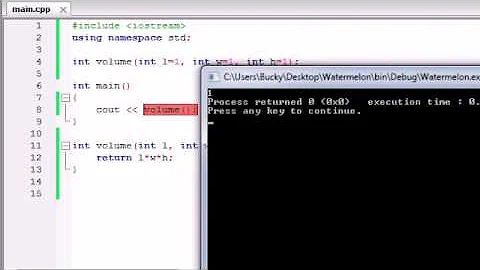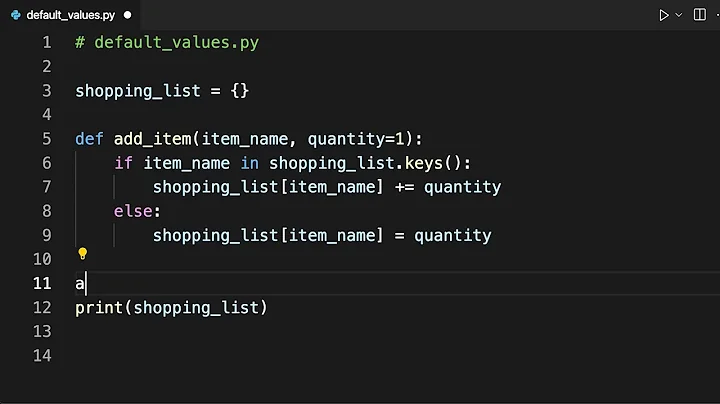Using Default Arguments in a Function
Solution 1
I would propose changing the function declaration as follows so you can do what you want:
function foo($blah, $x = null, $y = null) {
if (null === $x) {
$x = "some value";
}
if (null === $y) {
$y = "some other value";
}
code here!
}
This way, you can make a call like foo('blah', null, 'non-default y value'); and have it work as you want, where the second parameter $x still gets its default value.
With this method, passing a null value means you want the default value for one parameter when you want to override the default value for a parameter that comes after it.
As stated in other answers,
default parameters only work as the last arguments to the function. If you want to declare the default values in the function definition, there is no way to omit one parameter and override one following it.
If I have a method that can accept varying numbers of parameters, and parameters of varying types, I often declare the function similar to the answer shown by Ryan P.
Here is another example (this doesn't answer your question, but is hopefully informative:
public function __construct($params = null)
{
if ($params instanceof SOMETHING) {
// single parameter, of object type SOMETHING
} elseif (is_string($params)) {
// single argument given as string
} elseif (is_array($params)) {
// params could be an array of properties like array('x' => 'x1', 'y' => 'y1')
} elseif (func_num_args() == 3) {
$args = func_get_args();
// 3 parameters passed
} elseif (func_num_args() == 5) {
$args = func_get_args();
// 5 parameters passed
} else {
throw new \InvalidArgumentException("Could not figure out parameters!");
}
}
Solution 2
Optional arguments only work at the end of a function call. There is no way to specify a value for $y in your function without also specifying $x. Some languages support this via named parameters (VB/C# for example), but not PHP.
You can emulate this if you use an associative array for parameters instead of arguments -- i.e.
function foo(array $args = array()) {
$x = !isset($args['x']) ? 'default x value' : $args['x'];
$y = !isset($args['y']) ? 'default y value' : $args['y'];
...
}
Then call the function like so:
foo(array('y' => 'my value'));
Solution 3
It is actually possible:
foo( 'blah', (new ReflectionFunction('foo'))->getParameters()[1]->getDefaultValue(), 'test');
Whether you would want to do so is another story :)
UPDATE:
The reasons to avoid this solution are:
- it is (arguably) ugly
- it has an obvious overhead.
- as the other answers proof, there are alternatives
But it can actually be useful in situations where:
-
you don't want/can't change the original function.
-
you could change the function but:
- using
null(or equivalent) is not an option (see DiegoDD's comment) - you don't want to go either with an associative or with
func_num_args() - your life depends on saving a couple of LOCs
- using
About the performance, a very simple test shows that using the Reflection API to get the default parameters makes the function call 25 times slower, while it still takes less than one microsecond. You should know if you can to live with that.
Of course, if you mean to use it in a loop, you should get the default value beforehand.
Solution 4
function image(array $img)
{
$defaults = array(
'src' => 'cow.png',
'alt' => 'milk factory',
'height' => 100,
'width' => 50
);
$img = array_merge($defaults, $img);
/* ... */
}
Solution 5
PHP 8 using Named Arguments
What if I want to use the default value for argument $x and set a value for $y?
foo($blah, $x = "some value", $y = "some other value")
Usage-1:
foo(blah: "blah", y: "test");
Usage-2:
// use names to address last arguments
foo("blah", y: "test");
Native functions will also use this feature
htmlspecialchars($string, double_encode: false);
// Same as
htmlspecialchars($string, ENT_COMPAT | ENT_HTML401, 'UTF-8', false);
About the Feature and Documentation
Named arguments allow passing arguments to a function based on the parameter name, rather than the parameter position. This makes the meaning of the argument self-documenting, makes the arguments order-independent, and allows skipping default values arbitrarily.
IDE Support
Netbeans 12.3 fully supports PHP 8.0 syntax including this feature, with the exception of code completion for named arguments.
Related videos on Youtube
Comments
-
renosis almost 2 years
I am confused about default values for PHP functions. Say I have a function like this:
function foo($blah, $x = "some value", $y = "some other value") { // code here! }What if I want to use the default argument for $x and set a different argument for $y?
I have been experimenting with different ways and I am just getting more confused. For example, I tried these two:
foo("blah", null, "test"); foo("blah", "", "test");But both of those do not result in a proper default argument for $x. I have also tried to set it by variable name.
foo("blah", $x, $y = "test");I fully expected something like this to work. But it doesn't work as I expected at all. It seems like no matter what I do, I am going to have to end up typing in the default arguments anyway, every time I invoke the function. And I must be missing something obvious.
-
Matti Virkkunen over 12 yearsYou're probably not missing anything, the PHP developers probably missed this.
-
 Kai Qing over 12 yearsThat's an interesting question. I've never actually had the need to do this as you've stated since I only use default args to expand functions inherited by other programmers when I am not sure what depends on the original. I'm curious about an answer.
Kai Qing over 12 yearsThat's an interesting question. I've never actually had the need to do this as you've stated since I only use default args to expand functions inherited by other programmers when I am not sure what depends on the original. I'm curious about an answer. -
 Madara's Ghost over 12 yearsOne of the best questions I've seen in a while! Have you tried passing nothing?
Madara's Ghost over 12 yearsOne of the best questions I've seen in a while! Have you tried passing nothing?foo("blah", , "test");? -
Mouse Food over 12 yearsThe rule is that default arguments can only follow arguments. That is you could have foo("blah") and x,y are default, or foo("Blah","xyz") and y is the default.
-
ThinkingMonkey over 12 yearsWhat is the behavior that you are getting? Your code seems right!
-
renosis over 12 years@ThinkingMonkey, well, when I set null or "" for the second default value it replaces the default value with the null... as for the foo("blah", $x, $y = "test); I get an undefined variable for $x. If I do something like foo("blah", $y = "test"); it replaces the $x value with test instead of $y.
-
 David over 5 yearsPossible duplicate of "How would I skip optional arguments in a function call?".
David over 5 yearsPossible duplicate of "How would I skip optional arguments in a function call?". -
jmdavalos over 4 yearsExpected behavior. See "Default argument values" section in: php.net/manual/en/functions.arguments.php -- null value and empty string are accepted as actual arguments to the function
-
 RationalRabbit over 3 yearsYou could just send an array and deal with it however you need to.
RationalRabbit over 3 yearsYou could just send an array and deal with it however you need to. -
 ClarkeyBoy over 2 yearsI tend to use a mix - either an array and use custom function
ClarkeyBoy over 2 yearsI tend to use a mix - either an array and use custom functiongetArrayValue($array, $key, $default)- if $key doesn't exist in $array, $default is returned, or I usefunction doSomething($a, $b = null, $c = null)and useif(is_null($b)) $b = $bDefault)within the function body. This way I can calldoSomething("bob", null, "fred")and the null will be overridden with the default value of $b.
-
-
 Tim Cooper over 12 yearsYour condition should really be
Tim Cooper over 12 yearsYour condition should really beisset($args['x']), as it would currently replace an empty string, empty array, orfalsewith the default value. -
 kitti over 12 years@TimCooper lol I went to change based on your first comment that it should be '=== null', went and changed my answer to use isset instead, then came back to see you changed your comment too. :D
kitti over 12 years@TimCooper lol I went to change based on your first comment that it should be '=== null', went and changed my answer to use isset instead, then came back to see you changed your comment too. :D -
renosis over 12 yearsAh, drat! I don't like that at all... Oh well, you can't have everything. I suppose I will have to put a little more thought into the order of my default arguments then. Thanks!
-
TRiG about 12 yearsThat would work, but I find using
nullin this instance to be conceptually neater thanfalse. -
zloctb over 8 yearsWHy not $x = isset($x) ? $x :'default value'; ?
-
 DeveloperWeeks over 8 years@zloctb this is a clean and readable null check. Looks like it is developer preference. Either $x = isset($x) ? $x :'default value'; or $x = is_null($x) ?'default value':$x; would work as well as this solution. It is a preference choice about readability and maintenance.
DeveloperWeeks over 8 years@zloctb this is a clean and readable null check. Looks like it is developer preference. Either $x = isset($x) ? $x :'default value'; or $x = is_null($x) ?'default value':$x; would work as well as this solution. It is a preference choice about readability and maintenance. -
DiegoDD over 7 yearsJust to clarify for future readers. The first solution obviously makes it impossible to assign a real
nullvalue to the parameter, since every time it would assign the default value. Even in case you had another special value for when you actually want a null (e.g. when $x == "use_null" make $x = null), then you wouldn't be able to assign such special value as the literal value of the parameter (in this case, the "use_null" string). So just be sure to use a unique, never desired "key" for when you want to use the default value (and you wantnullto be a valid option) -
Bryan almost 7 yearsWhat is the reason for not wanting to do this? Seems pretty handy.
-
Sean the Bean over 6 yearsAm I missing something? This doesn't seem to answer the question at all, but it has 7 upvotes. Maybe adding a bit of explanation would help?
-
MestreLion almost 6 years@SeantheBean: true, an explanation would be better, but his point is: since PHP does not have named arguments, use an associative array as its single parameter.
-
 Frank Forte over 5 yearsUnfortunately, you will not be able to assign null with this answer. This is a better option:
Frank Forte over 5 yearsUnfortunately, you will not be able to assign null with this answer. This is a better option:$x = !array_key_exists('x',$args) ? 'default x value' : $args['x']; -
 Frank Forte over 5 yearsIt is more helpful to use the example given in the question, e.g.
Frank Forte over 5 yearsIt is more helpful to use the example given in the question, e.g.$defaults = [ 'x' => 'some value', 'y' => 'some other value']; -
ToolmakerSteve over 5 yearsAdding to TriG's comment,
falseis a riskier choice thannull, because php is a non-strict language.!$xwill be true for several different inputs, that may surprise the programmer:0,''. Whereas withnull, you can use!issetas a stricter test. -
SubjectDelta almost 5 yearsInternal usage of ReflectionFunction on itself would save the price!
-
 Sadee over 4 yearsYou can use
Sadee over 4 yearsYou can use$args['item1'] = $args['item1']??'default value';in PHP 7+. if $args['item1'] is null thendefault valuestring will assign to $args['item1'] -
 Eaten by a Grue over 3 yearsLovely but unfortunately doesn't work on internal functions:
Eaten by a Grue over 3 yearsLovely but unfortunately doesn't work on internal functions:Uncaught ReflectionException: Cannot determine default value for internal functionswhich is a bit stupid since the docs read: "Gets the default value of the parameter for any user-defined or internal function or method" -
thelr about 3 years"Modern"? This answer won't age well. Please specify what PHP versions this is relevant for.
-
 ClarkeyBoy over 2 yearsRegarding IDEs - it is easy enough to get to the function definition - ctrl + click function or class name in PHPStorm. So long as you stick to some common approach of putting the defaults as the very first line(s), it's easy to adapt. That being said, there is no solution without a downside - they all have their disadvantages.
ClarkeyBoy over 2 yearsRegarding IDEs - it is easy enough to get to the function definition - ctrl + click function or class name in PHPStorm. So long as you stick to some common approach of putting the defaults as the very first line(s), it's easy to adapt. That being said, there is no solution without a downside - they all have their disadvantages. -
 Obed Parlapiano about 2 yearsAh yes. The beauty of PHP
Obed Parlapiano about 2 yearsAh yes. The beauty of PHP









